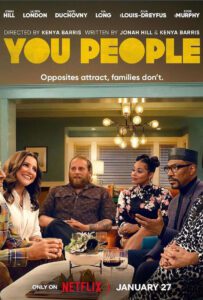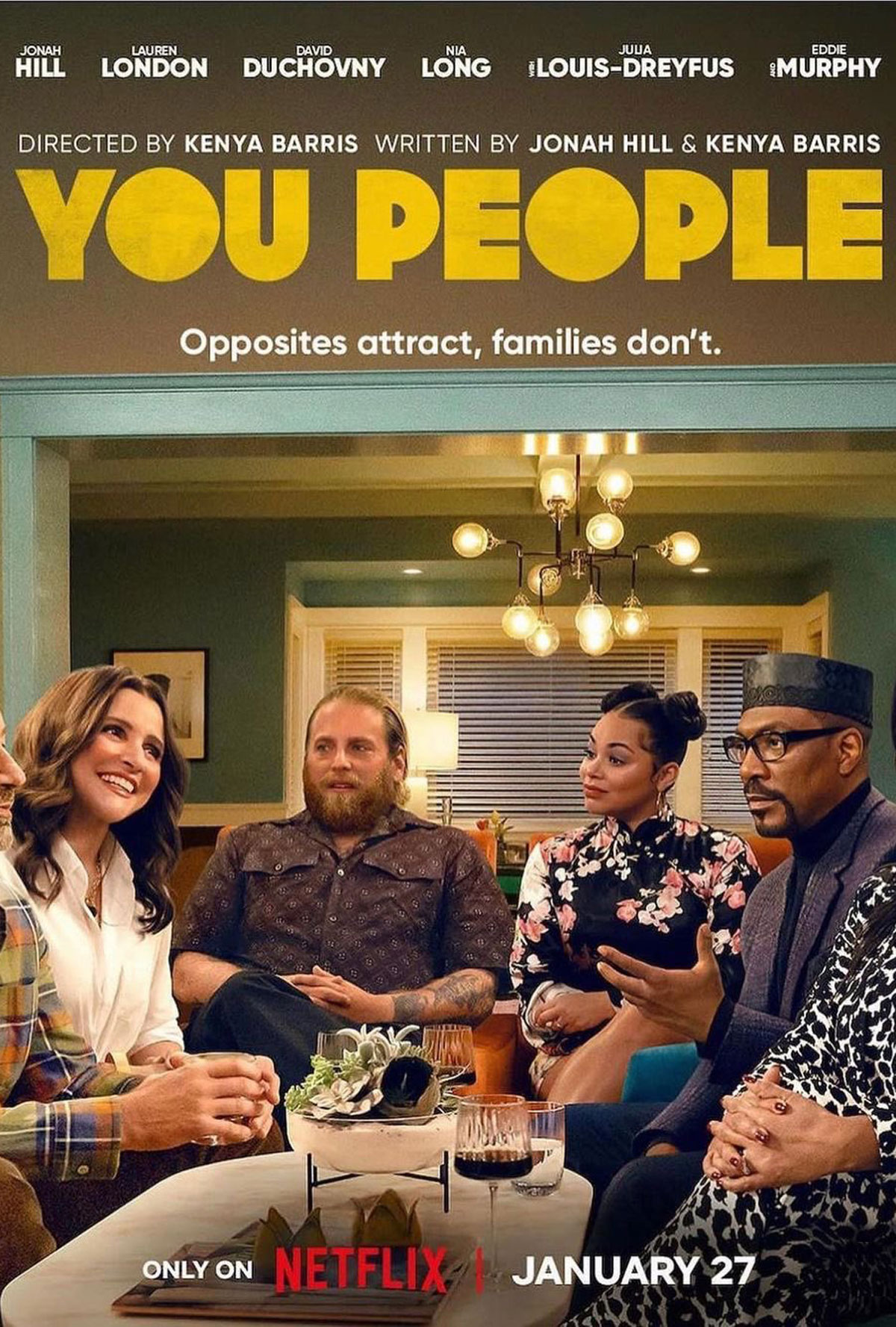
Director: Kenya Barris
Release Year: 2023
Runtime: 1h 57min
I think, if I squint, I can see what the creator of You People was going for. But the actual execution left me a little confused. Or, not confused, but curious why some choices that seemed to move against the proposed message were implemented. The “slickness” of the production, some of the broad comedy and even the complete lack of warmth between the two main characters didn’t speak to what I assume was supposed to be a modern-day romantic comedy. Because romance didn’t seem like it was anywhere in the equation. And the whole race relations thing was a muddled mess, frankly. Granted, I’m only coming at it from one side of that equation, but even I could tell things were a little… weird. I mean, I loved Public Enemy back in the day. And can recite the lyrics to “Bring the Noise” in my sleep. But I, for one, do not think Farrakhan’s a prophet. And while we explore white appropriation of Black culture and dumb, white liberals’ misunderstanding of everything from Black hair to white savior culture, I can’t say I got a whole lot of balance in that argument. It’s touched on, but then nothing.
So, we have a very odd-looking Jonah Hill (Ezra). He has some oddball finance day job — which in itself feels stereotypical and very much yada-yada’ed — but lives for his podcast on “culture” with his buddy, Mo (Sam Jay). He’s a rich kid who can clearly sleepwalk through his actual money-earning gig because his parents (Julia Louis-Dreyfus and David Duchovny) live in Brentwood. That shit hits very close to home, literally. On the other side is Amira (Lauren London), who apparently has to work very hard at her fashion designer job and fight against the racist Harvard guys who have never heard of Howard University and care about where a fashion designer went to college? You know that Harvard white boys’ club fashion design clique… That’s some clumsy shit right there and immediately made me think, “Oh, this is the level of discourse we’re engaging in?” It’s not to say this kind of thing doesn’t happen all the time, of course, but the example used to illustrate it is kind of asinine.
So, these two unlikely characters end up meeting and going on a date. Why, though? We know Ezra is tired of going on dates with the stereotypical vapid Jewish princesses. Because we’re shown that. And we know the dude is obsessed with Black culture. Because we’re shown that. We’re also shown him essentially rejecting his faith and apologizing for his whiteness. But why on Earth does Amira go out with him? We’re to understand she’s never dated a white dude. And she’s clearly way out of his league. His embarrassing tie-dye terrycloth shorts/hoodie ensemble he shows up in on the first date should have been the end of it, but for some completely unknown reason she’s into him. Though none of that is evident on screen.
Things progress quickly and all-of-a-sudden they’re moving in together. And wearing what amounts to snow suits to bed together. It’s not as if I need to see Hill in his skivvies, but it literally feels like London had requested they have not an ounce of skin showing when they are asked to enter each others’ space. It was noticeably weird. Meanwhile we’re shown Ezra’s parents’ cluelessness about everything from BLM to Pimp My Ride, and are only really peripherally introduced to Amira’s blackness and her Muslim faith. Which she is surprisingly serious about. Despite eating bacon and never really mentioning it prior to the whole marriage talk. And I get the microaggressions perpetrated by Ezra’s parents. Things that are well-intentioned, but just clueless and clearly mortifying to Ezra. Been there.
But then we meet Amira’s folks, Akbar (Eddie Murphy) and Fatima (Nia Long). They are clearly successful, well-off people as well. So… I’m not sure what we’re doing here. But Fatima seems lovely. And Akbar is essentially the dad from Meet the Parents. He’s an asshole who doesn’t think Ezra is good enough for his daughter. Which, honestly, he probably isn’t. But they couch that in the fact he’s white. When, in fact, he’s just kind of a loser. And has weird hair and even weirder tattoos. But when they get together with Ezra’s parents, Akbar starts in with his Farrahkhan stories, praising the rather insane anti-semetic minister. To a group of Jews. Something that is clearly a macroagression. And one that Ezra’s mother starts to protest, but is quickly shut down. With the only punishment being her accidentally setting his prized kufi on fire. Which, of course, leads to apologies and general admonishment. And is meant to mean I’m not sure what, honestly.
So, at the end of everything, the issue is that this white, Jewish family has to apologize for all of white peoples’ failings in understanding Black culture and Black people in general. Whereas Akbar just has to apologize for being a jerk. And it’s not that there aren’t completely legit points made about ignorance and seeing the Black daughter-in-law as a talking point more than an individual human being. But if this is meant to be a dialogue, it fails all the way around. Especially when we roll into the ending — which logistically is just really impossible — we kind of undo even the little things we’ve been led to believe about inherent and intrinsic racism. Like all of white folks’ racial blindspots were undone by listening to a couple podcasts and reading Xzibit’s autobiography. And Akbar’s dislike and distrust of Ezra and his desire for his daughter to marry a black dude was the only blocker on his side. Even though Ezra has actually given him a pretty large reason to distrust him as an individual (that includes coke and hookers).
Look, I took half a sociology class in college. And I didn’t attend a university anywhere near the quality of Howard. So I’m certainly not one to comment on race relations in America. Or, obviously, the Black experience in the US. However, I am Ezra. Like almost exactly. Minus some serious square footage in that house he grew up in. So I understand that mindset on the other side. And I recognize some of the areas they touch on. But these are just surface issues. There was no investigation into why things are the way they are. So there are just stereotypes. And just surface shit written for laughs. And not a whole lot of looking in the mirror. But maybe that wasn’t the intention with this — though it feels like it was? Putting all of my muddled thoughts aside, I think the issues start with the casting. Maybe if there were different leads — or different leads together — this would have worked better. You would have gotten that “us against the world” feeling more than you do here. Instead, it just feels like people on two sides of an unbalanced exploration talking past each other through three sloppy acts that end up with a musical interlude and message that doesn’t hit.


